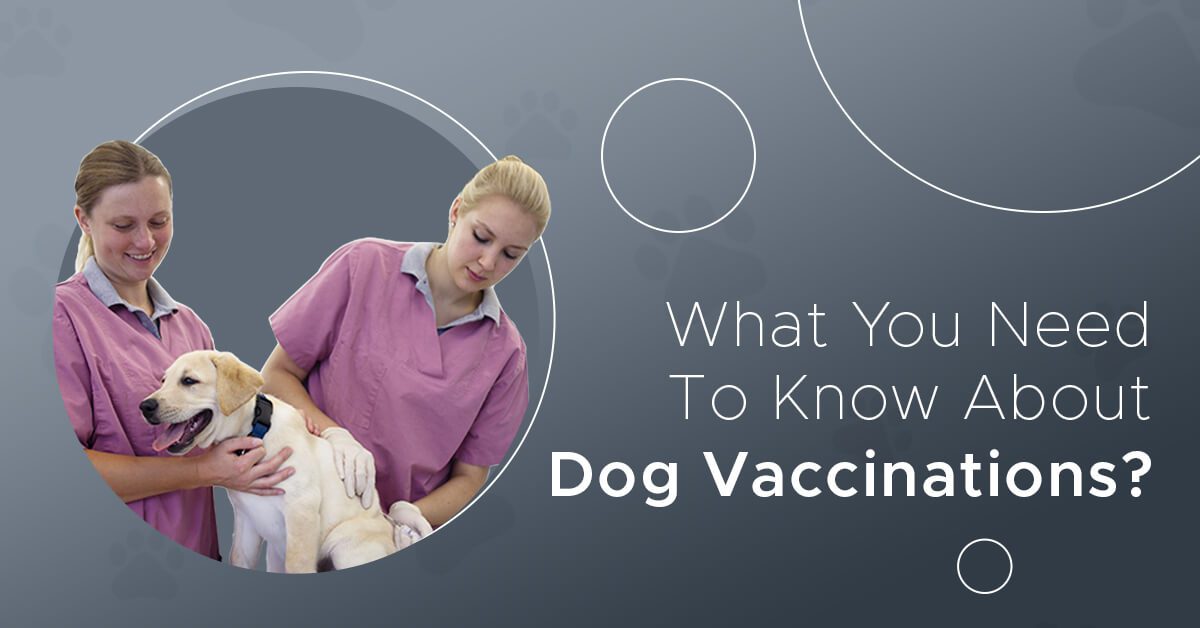
What You Need To Know About Dog Vaccinations?

Vaccinating a dog is not only the responsibility of every owner, but this is the very first concern that will help keep your dogs and puppies healthy and stay protected from many diseases. Dog Vaccinations are very much important for their health and behaviour.
Before starting the first vaccine, a thorough check-up by the veterinarian is recommended to assess the health of your dogs and puppies. Dog vaccination is usually carried out with multivalent vaccines containing a set of antigens from several common infections at once.
Vaccination must be done when the dogs are healthy. If they have colds or other illnesses, you can start vaccinating them after their illness passes. The owner of the dog should be attentive not only to the daily care of the pet but also to its health. The greatest harm can be caused by infectious diseases, some of which end in the death or disability of the animal. This is why it is important to get your dogs vaccinated.
The Most Common Ailments For Which Dog Vaccinations Are Available:
- Rabies
- Plague of carnivores
- Lyme disease
- Hepatitis
- Parvovirus enteritis
- Leptospirosis
- Parainfluenza
Advisable Age For Dog Vaccinations
Young dogs are usually vaccinated from 8 weeks of age. In some cases, under unfavourable conditions, vaccination begins at 4 weeks.
Primary vaccination is carried out twice, then annual revaccination is required. You can give a vaccine to a dog starting from the age of 1.5 months. As a rule, puppies are vaccinated to protect against diseases such as plague, enteritis, and ringworm. In most cases, pets are vaccinated at the age of 2-2.5 months. If your dog is sick or has a weakened immune system, the doctor may give you a respite.
Early Vaccination in Special Cases
It is recommended not to vaccinate puppies younger than 7-8 weeks of age. This is explained by the fact that they have protection in the form of passive immunity acquired with breast milk. Its action lasts 1.5 months.
However, there are special situations when a puppy is vaccinated earlier. At 1-1.5 months of age, the pup can be given an anti-plague and anti-parvovirus vaccine.
Dog Vaccinations Rules That You Must Follow
Remove Worms: Deworming is required before vaccination. Then, you must wait for another 7-10 days.
Annual Vaccination: Annual vaccination of dogs is essential. The procedure is repeated annually, it is not recommended to skip it again. The interval between vaccines should not exceed a year, but a few weeks will not make the weather. If your dog is sick, pregnant, or just away from the veterinary clinic, don’t worry. Go to the vet when the dog is ready.
Only Vaccinate a Healthy Dog: Make sure your dog is in good health before vaccinating your dog. If your dog is undergoing treatment or has just recovered, you cannot vaccinate him yet.
You Can Not Vaccinate Pregnant and Lactating Dogs: In the meantime, the dog’s immunity is usually weakened. Wait until the dog has built up the strength it needs to fight the virus and develop immunity.
Important Tips You Must Keep in Mind For Dog Vaccinations
All vaccinations should be done only by a veterinarian! Deworming must be carried out no later than 14 days before taking the vaccine for dogs and puppies. After vaccination, the dog must be quarantined. It should not be walked, bathed, protected from drafts, protected from contact with other animals.
Be sure to check for vaccinations on the dog you took from the street. To do this, you need to donate blood to determine the level of antibodies. Ignoring timely vaccination of your dog can also lead to leash reactivity in them and can affect the dog behaviour too.
The reasons for early immunization of babies up to 2 months can be:
- The emergence of an epidemic situation in the nursery.
- Feeding the puppies artificially, and not with mother’s milk.
- Lack of vaccinations in the mother.
- There is a possibility of contact with infected animals.
Preparing your puppies for vaccination correctly
The preparation of a pet for immunization should be started 12-15 days before. What needs to be done:
- Treat once for blood-sucking parasites: tick-borne, flea 10 days before vaccination.
- Treat worms, if there is an infection with helminths, then twice, if not, then once.
- The procedure is also carried out 10 days before the injection.
- Exclude excessive physical exertion, stress, overwork, this requires a 3-week period before vaccination.
On the day of the manipulation, it is recommended to cancel feeding the puppy. If it’s evening time for your vet visit, you can feed a small amount of dry or low-calorie regular food.
Possible complications after dog vaccinations
In rare cases, allergic reactions may occur, most often manifested by edema, which requires simple symptomatic treatment. As a rule, such complications arise quite quickly, within about 10-15 minutes after the injection of the vaccine, therefore it is advisable to stay in the clinic for about half an hour after taking the vaccine for dogs and puppies.
Common complications are characterized by the following:Â
- The dog looks lethargic.
- Refuses to eat.
- And the body temperature may rise slightly.
If the painful condition lasts longer, you should see your vet.
There are times when certain drugs can cause an allergic reaction, allergy symptoms are:Â
- Increased salivation
- Weakness
- Shortness of breath
- Blue mucous membranes of the mouth
If your dog has these symptoms, you should immediately take your dog to the veterinarian. It is imperative to vaccinate your pets against infections, even if it is planned that they will live in an apartment all their lives and not leave the house anywhere.
This should not be taken lightly, because following all the necessary precautions will help your pet to cope with a difficult period and preserve its health for years to come.
Do I Have to Deworm My Puppy Before Vaccinating?
It is important to deworm your puppy very well before their vaccination. Once the vaccination plan has been completed, your dog should be internally dewormed periodically every 3-4 months and before each revaccination. Remember that in times of cold and vaccination you can help their immune system with vitamins to prevent their defenses from lowering.
What To Do If Your Dog Has a Bump After Vaccination?
If, after vaccination, the dog has a bump in the place where the injection was given, there is no need to worry about this. After a few days, the bump should dissolve by itself. If within two weeks it has not disappeared, then you can contact your veterinarian.
How Vets Treat Dogs and Puppies At The Time Of Vaccinating?
Veterinarians conduct a general examination of the dog, measure the body temperature, and weight. If the pet is clinically healthy, and you have no complaints about its general condition, then the vet will inject an allergy drug into the thigh.Â
Many breeds are highly prone to allergic reactions, despite the “mild” modern vaccines. After a couple of minutes, they inject a vaccine into the area of ​​the withers.
Conclusion
Remember to vaccinate your dog regularly! Immunity decreases the more, the longer you do not vaccinate your pet. Domestic companion dogs are no less susceptible to diseases than active walkers. Loving your pet means taking care of it!  Â
If you found this article useful then please share it and if you have any queries then do let us know. And, for more such helpful articles, stay connected to Primal Needs.

